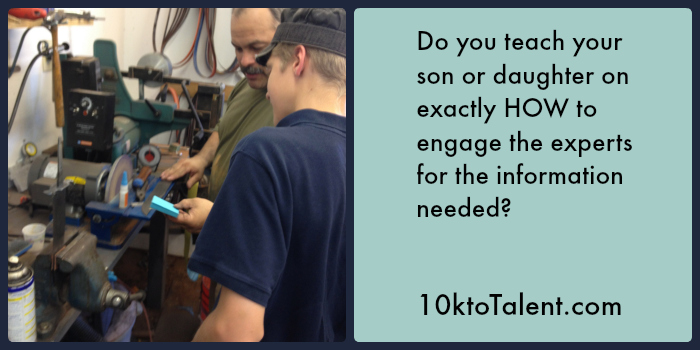In the book “Outliers: The Story of Success” by Malcolm Gladwell, he has a chapter entitled “The Problem With Geniuses, Part II.” In that chapter, he discusses what seems to be quite a big missing social skill in children who are otherwise academically well taught, but can’t seem to socially climb the talent ladder within their talent field. He boils it down to one basic reason: those children do not know how to engage and question authority figures in a way that helps them make progress. And this lack of social intelligence hurts them later in their adult life. They tend to just sit passively and let authority figures drone on and on without ever knowing how to interrupt to redirect the conversation in a way that is more helpful to the child.
A typical example of that type of behavior is that when the child, with that lacking social skill, goes to the doctor’s office, he just sits there quietly with very little verbal feedback to the doctor, who in turn just gives instructions. But here is the most interesting part: this type of child is actually mirroring his parent’s behavior. It has been observed that when the parents of that same child visit the doctor for their own needs, they also sit very quietly with eyes lowered as the doctor engages in a monologue.
Compare now the very different behavior of the child who respectfully, but assertively, interrupts the doctor to provide him more accurate information about his personal medical condition. In response to the child’s questions, the doctor modifies or clarifies his original information for the benefit of the young person’s understanding. Where does that social intelligence from the child come from? This intelligent social behavior seems to be learned from the parents and not from an innate personality trait. In this medical example, the child has usually been prepped by his mother beforehand as to what kind of questions might be asked of him by the doctor. He’s also instructed by his mother to make sure to ask that authority figure to provide better information if he doesn’t fully understand to his satisfaction.
That is the key: parents, whether mother or father, are key to teaching their children by patterning and by explicit verbal instruction on how to vigorously engage themselves with experts. This is important. Because with that ability to question, they can make progress in their understanding that is applicable to their situation. Children do NOT naturally learn that skill on their own. Parents who believe that it can be learned and passed on, act on this belief and take time to instruct on how to address authority figures and on how to extract information from them.
This is why I frequently run through a little informal prep session with my own sons. I check with them to hear if they are ready to answer questions with an expert they are about to meet for the first time. I check to see if they are also ready with their own list of questions to ask. I also prep them with how to respectfully, but assertively, redirect adults off of inappropriate topics when the adults have social difficulty staying to the topic of their expertise. Sometimes we will also run through possible scenarios where we discuss how to handle an adult who is extremely introverted. We also talk about scenarios of the other extreme: how to handle an adult who is so enjoying the rapt attention of my respectful child that he forgets to actually “teach” to the situation at hand. All this respectful and balanced social engagement, instead of turning off adult experts, actually draws them in more into wanting to help a young person.
This teaching our children on how to respectfully engage authorities is one of the building blocks to talent success. This parental input makes a significant difference in the lives of our offspring. I encourage you to harness this social skill to teach your sons and daughters how to use in the context of the their talent growth. If you have an interesting story on how your child was able to use that social skill to win over an expert to helping them out, I would love for you to share it with me.
(updated: 1/17/2015)


